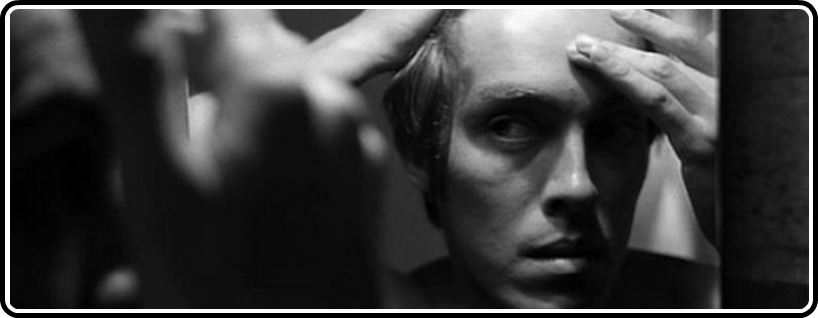When people think of a director like David Cronenberg, things come to mind ranging from his appreciation and popularizing of a little sub-genre known as body horror cinema and a utilitarian style that can cover things like crime pictures (Eastern Promises) to an anti-erotic thriller (Crash). However, the last thing anyone thinks of would have to an affinity for brooding and philosophical science fiction.
Hitting the scene hard with films like Rabid and The Brood in the late ‘70s only to smash the film world in the mouth with his still superb and rumored to be Criterion Approved Scanners, the director had actually been hard at work on TV and independent short films, only to make his feature film debut with a little-seen experimental sci-fi film known as Stereo.
Arriving in 1969, the film is a decidedly different picture than we have ever seen from Cronenberg, evoking stylistic cues from names like Kubrick and intellectual touches seemingly influenced by filmmakers like Rainer Werner Fassbinder. A passion project, the film is written, shot, edited and directed by the Canadian auteur, and stars the director’s earliest muse, Ronald Mlodzik. Mlodzik (who would star in Cronenberg’s subsequent films like Crimes Of The Future, Shivers and Rabid) stars as a mysterious young man who arrives at a place known as the Canadian Academy Of Erotic Enquiry. Ostensibly a collection of video from what would be an educational picture for those looking to enter the academy, the film follows a group of men and women as they are given special telepathic abilities that grow as they become more and more sexually active. When things begin to go south, things take a turn for the dark in what is an entirely silent picture save for voice over narration which is actually played as philosophical musings by the experimenters involved in this attempt to create a utopian, more advance, society.
Aesthetically, the film is unlike anything we’ve ever seen from Cronenberg. Seemingly directly inspired by the headier science fiction of the era, the film has influence ranging from the icy cold set design and brooding tracking shots of a director like Kubrick, to the angular and tension-building production design of something like German Expressionism. Seemingly closer in tone and style to an odd mix of Fassbinder’s World On A Wire and The Cabinet Of Dr. Caligari, Stereo is a deeply haunting meditation on the power of burgeoning sexuality, and while there are glimpses of what would come later on in Cronenberg’s career stylistically (particularly one moment involving a drill), the picture is a truly shocking look into a director trying to find his voice. Full of energy, the film’s runtime may only be 60 minutes, but Cronenberg’s debut is a brazen first film that feels raw and truly vital.
That all said, there are themes here that Cronenberg is still trying to work out. With plot points seemingly rehashed in the picture’s closest relative, Scanners, themes found within this picture, particularly revolving around sexuality, will be seen in everything ranging from A Dangerous Method all the way back to a picture like Crash. The picture itself doesn’t rely on any performances (none of which are great or even, honestly, remotely good), instead acting as truly nothing more than a director’s attempt at experimenting with style and genre. The aforementioned themes here are portrayed in heady and seemingly pretentious musings from unknown narrators but are presumably nothing more than superficial, and while that would be a hindrance in a film with less style, the aesthetic here is so thrilling and unlike anything Cronenberg has touched since, that it’s a truly intriguing debut film from a director who has seemingly reverted in style but expanded in his themes and intellectual leanings.
Overall, the film is an odd nut to crack. Superficial in many ways, the film is a lot of style for not truly much substance. Fans of experimental science fiction will find pseudo scientific musings on sexuality and telepathy entrancing, as they truly are, but what is most thrilling about this picture is its example of a director in his most raw and experimental state. A definitive “first film,” Stereo is unlike anything Cronenberg has made to date, with arguably his most intriguing direction to date. Absolutely pitch black in every single way possible, this was Cronenberg at his most raw.
Where would this fit in The Criterion Collection however? That’s tough to say. I myself don’t see much in the way of a singular release for the film, but add this to an “Early Cronenberg” Eclipse set with films like Crimes Of The Future and The Came From Within (apparently the film was actually included with a DVD of his film Fast Company so there is that) or as a supplement to the film’s closest kin, Scanners or Crash, and you’ll have a must-watch supplement. A telling starting point for a director who would only take off from this brooding bit of science fiction and become one of today’s greatest and most influential genre filmmakers, Stereo is far from Cronenberg’s best, but it’s more than deserving as a historical document of a director in his earliest and most formative state.




![Bergman Island (The Criterion Collection) [Blu-ray]](https://criterioncast.com/wp-content/uploads/2022/11/bergman-island-the-criterion-collection-blu-ray-400x496.jpg)
![This Is Not a Burial, It’s a Resurrection (The Criterion Collection) [Blu-ray]](https://criterioncast.com/wp-content/uploads/2022/11/this-is-not-a-burial-its-a-resurrection-the-criterion-collection-blu-ray-400x496.jpg)
![Lars von Trier's Europe Trilogy (The Criterion Collection) [The Element of Crime/Epidemic/Europa] [Blu-ray]](https://criterioncast.com/wp-content/uploads/2022/11/lars-von-triers-europe-trilogy-the-criterion-collection-the-element-of-400x496.jpg)
![Imitation of Life (The Criterion Collection) [Blu-ray]](https://criterioncast.com/wp-content/uploads/2022/11/imitation-of-life-the-criterion-collection-blu-ray-400x496.jpg)
![The Adventures of Baron Munchausen (The Criterion Collection) [4K UHD]](https://criterioncast.com/wp-content/uploads/2022/11/the-adventures-of-baron-munchausen-the-criterion-collection-4k-uhd-400x496.jpg)
![Cooley High [Criterion Collection] [Blu-ray] [1975]](https://criterioncast.com/wp-content/uploads/2022/11/cooley-high-criterion-collection-blu-ray-1975-400x496.jpg)